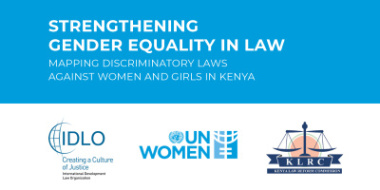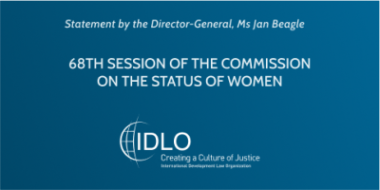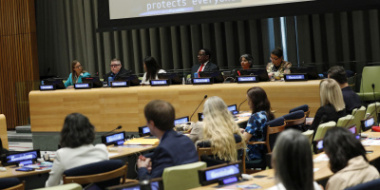Gender Equality
Gender inequality is an affront to human dignity, a challenge to the rule of law and an obstacle to development. Denying women of their rightful place in society – by depriving them of equal access to education, justice or livelihood – means robbing societies of the talent and potential of half of their members. In securing every social need from peace to food, the role of women has been shown to be paramount.
Although gender equality is increasingly a feature of national Constitutions, the law often continues to restrict women's rights and freedoms, dictates their submission to male relatives, or limits what they may own or inherit.
Advice from Justice Doherty to women: “Take any chance you get”
Born and raised in Portstewart, Northern Ireland, Justice Teresa Doherty spent 11 years as the only woman to hold high judicial office in the Pacific Islands.

Jordan: Research highlights barriers for women entrepreneurs
Lack of legal awareness, insufficient access to lawyers and justice mechanisms perceived as ineffective or unaffordable are among the obstacles most commonly experienced by women entrepreneurs in Jordan when attempting to access justice, according to the findings of a baseline assessment presented yesterday in Amman by the European Bank for Re

Strategic Investment in Rule of Law Programming
Growing insecurity and instability, recurring and protracted conflict and violence, increasing inequality, exclusion and discrimination, deterioration of international human rights and humanitarian norms, all signal the importance of strengthening the rule of law in today’s rapidly changing world. Notably, Goal 16 of the 2030 Agenda for Sustainable Development seeks to promote peace, justice and strong institutions.
Justice for women: Access, empowerment and representation
From conflict-affected countries and fragile states, to the halls of the most powerful decision-making bodies, women face significant barriers when it comes to access to justice, gender equality and empowerment.
Strengthening Access to Justice through Legal Aid in Indonesia
In 2011, Indonesia adopted a law on legal aid which includes a national budget for legal aid providers to deliver access to justice and legal aid services to the poor. However, there is a lack of legal aid lawyers and organizations throughout the country, and lawyers do not necessarily have the sufficient skills for delivering legal aid services with a human rights, gender equality and social justice perspective. Many organizations also deal with a limited administrative capacity and struggle to meet the requirements in conducting legal aid reimbursement.
Mongolia and U.S. exchange ideas on combatting domestic violence
Home to around 2,600 Mongolian Americans, the city of Arlington, Virginia has one of the largest Mongolian populations in the United States, to the point that Mongolian is the third-most widely spoken language in the local school system.
Access to Justice for Women and Girls - Rule of Law in Action
HIGH-LEVEL SIDE EVENT
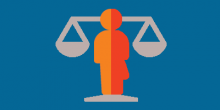
Inaugural meeting of High-level Group on Justice for Women
Inaugural meeting: High-level Group on Justice for Women
High-level Group on Justice for Women
Inaugural Meeting: High-level Group on Justice for Women
Update (as of July 27, 2018): The Inaugural Meeting Report is now available below
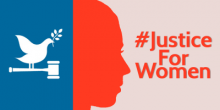
Pages
Key Initiatives
-
 Since the revolution in 2011, Tunisia has experienced a period of significant political transition and change culminating in the adoption of a new constitution in 2014, which called for justice reform and protection of women’s rights. However, the practical application of the framework for legal assistance in Tunisia demonstrates the insufficiency of existing relevant mechanisms. Therefore, there is the strong need to empower women to access justice and claim their rights.
Since the revolution in 2011, Tunisia has experienced a period of significant political transition and change culminating in the adoption of a new constitution in 2014, which called for justice reform and protection of women’s rights. However, the practical application of the framework for legal assistance in Tunisia demonstrates the insufficiency of existing relevant mechanisms. Therefore, there is the strong need to empower women to access justice and claim their rights. -
 In Somalia, alternative justice mechanisms remain the main providers of justice services for lack of formal justice institutions. However, these justice mechanisms can be discriminatory particularly against women, youth and minority clans.
In Somalia, alternative justice mechanisms remain the main providers of justice services for lack of formal justice institutions. However, these justice mechanisms can be discriminatory particularly against women, youth and minority clans. -
 Yemen, one of the poorest countries in the Arab world, has been devastated by armed conflict since September 2014. The conflict has received limited international coverage and human rights violations and violations under international humanitarian law suffered by the civilian population have been grossly underreported. All parties to the conflict have been linked to serious violations of international law, with inadequate accountability mechanisms in place to ensure justice for victims.
Yemen, one of the poorest countries in the Arab world, has been devastated by armed conflict since September 2014. The conflict has received limited international coverage and human rights violations and violations under international humanitarian law suffered by the civilian population have been grossly underreported. All parties to the conflict have been linked to serious violations of international law, with inadequate accountability mechanisms in place to ensure justice for victims. -
 Strengthening prevention and accountability for sexual and gender-based violence (SGBV) through the rule of law and access to justice has been a priority for the Government of Myanmar since 2011, when it embarked on an unprecedented transition towards democracy. SGBV cases are rarely reported and, when they are, the justice sector fails to provide adequate remedies. Therefore, there is a widely recognized need to increase prevention of and accountability for SGBV.
Strengthening prevention and accountability for sexual and gender-based violence (SGBV) through the rule of law and access to justice has been a priority for the Government of Myanmar since 2011, when it embarked on an unprecedented transition towards democracy. SGBV cases are rarely reported and, when they are, the justice sector fails to provide adequate remedies. Therefore, there is a widely recognized need to increase prevention of and accountability for SGBV. -
 In recent years Jordan has taken significant steps toward promoting economic development, including through strengthening rule of law. Judicial specialization in relevant areas, while promoting an enabling environment for capacity development within the relevant judicial institutions is crucial to maximize the impact of those efforts and ensure sustainability. At the same time, attention has been given to encouraging entrepreneurship, in particular women entrepreneurs, as a means to achieve economic growth.
In recent years Jordan has taken significant steps toward promoting economic development, including through strengthening rule of law. Judicial specialization in relevant areas, while promoting an enabling environment for capacity development within the relevant judicial institutions is crucial to maximize the impact of those efforts and ensure sustainability. At the same time, attention has been given to encouraging entrepreneurship, in particular women entrepreneurs, as a means to achieve economic growth.
Latest Activity
|
Publication
|
|
Policy Statements
|



